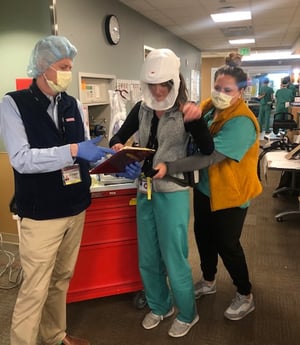
The public, and the news media alike, generally identify the front line fighters as being “doctors and nurses.” But there is another critical, yet often unknown, member of the health care team in every COVID-19 intensive care unit.
Coronavirus Shoes
When Dr. Paul Reynolds returns home after his shift as a critical care specialist at the University of Colorado Health Hospital, he enters his home through the garage, not the front door.
That’s so he can change out of his scrubs before he enters his house.
“I have a set of ‘coronavirus shoes’ that I don’t wear into the house,” Reynolds explains. “We had to make a decision, as far as the risk of me bringing home the virus, so my wife and child decided to live with their parents while I’m working on the COVID-19 unit.”
Across town, Dr. Rob MacLaren goes through a similar routine after his day as part of an intensive care team. “When I come back from the hospital, I’m stripping in the garage then straight to the shower,” MacLaren says. “It’s what we’re trained for first of all, so I think everyone understands that from a family perspective ... Other than that, I think there’s the general anxiety of the family when I’m going into the hospital and making sure I’m safe.”
Elsewhere, Dr. Joseph Saseen logs onto his computer to help lead the Extension for Community Health Outcomes (ECHO) Colorado Zoom meeting. Saseen is a member of the multidisciplinary team working to develop and distribute best practices for dealing with COVID-19. “Our goal is to improve patient care and the way we’re doing it is by empowering clinicians and other supporters with information,” Saseen says.

Behind the Mask
If you were to see any of these doctors in a clinical setting, you might assume they were physicians. But you would be wrong.
Reynolds, MacLaren and Saseen are all Doctors of Pharmacy, commonly referred to as PharmDs. In addition to their faculty responsibilities at the University of Colorado Skaggs School of Pharmacy and Pharmaceutical Sciences, they all serve in clinical or ambulatory care settings.
MacLaren, who is a critical care pharmacist, explains the key role that pharmacists play in the ICU. “We’re there to provide rational evidence-based medical decisions but also to educate the team, and that’s probably an area that gets forgotten ... During rounds we’re at the bedside, we’re with the team providing interventions that could be anything from appropriate antibiotic dosing to let’s try a different sedative for the patient or preventing an adverse reaction from a drug.”
According to MacLaren, one of the unique challenges associated with caring for patients with COVID-19 is the unusually large doses of sedatives that they require. “These patients are on non-physiological ventilator modes requiring a tremendous amount of sedation that really I haven’t seen before in my 20 years of practice. So, we’re trying to come up with innovative techniques to see how these drugs work together.”
In addition to managing the drugs that keep a COVID-19 patient comfortable while on a ventilator, critical care pharmacists develop therapeutic strategies that optimize safety for the entire medical team. “We’re thinking not only of the wellbeing of the patient, but also of the health care providers,” Reynolds explains. “We’re thinking about the medications that we’re selecting. Is there an alternative to a medication that’s longer acting? If so, that means that the nurse doesn’t have to go into a sick coronavirus patient’s room as often.”

Online Expertise
Unlike Reynolds and MacLaren, Dr. Saseen is an ambulatory care pharmacist. When he’s not teaching, he can be found in the UCHealth A.F. Williams Family Medicine Clinic, where he provides drug management and counseling to physicians and patients. During the coronavirus pandemic much of his normal clinical duties have gone online, including the professional lifeline that he provides to rural health care workers through the ECHO online platform.
“The overall goal is to provide information in a real-time resource. Imagine it, some clinicians may be out there, and they may be the only clinician for a very wide catchment area. So, to have some colleague support from experts at the University is comforting to
a lot of them,” Saseen says.
When asked about the value that pharmacists bring to the fight against COVID-19 Saseen was quick to answer,
“Pharmacists are essential workers. Period. Look at this crisis and looks who’s out there on the front lines. It is pharmacists and other health care providers.”
National Recognition
It appears that the nation is getting the message. Early on in the pandemic, the Office of the Assistant Secretary for Health issued new guidance under the Public Readiness and Emergency Preparedness Act authorizing licensed pharmacists to order and administer COVID-19 tests that the U.S. Food and Drug Administration has approved.
HHS Secretary Alex Azar stated, "Giving pharmacists the authorization to order and administer COVID-19 tests to their patients means

easier access to testing for Americans who need it. Pharmacists play a vital role in delivering convenient access to important public health services and information. The Administration is pleased to give pharmacists the chance to play a bigger role in the COVID-19 response, alongside all of America's heroic healthcare workers."
CU School of Pharmacy policy advocates are currently working with state leaders to make the authorization order operative in the state of Colorado. But for now, pharmacists across the state, and around the world, will continue the serve on the front lines of the pandemic as both the vocal medical expert for the health care team and, as Dr. Reynolds puts it, a silent partner for their COVID-19 patients.
“If you think about it, most of the patients that we’re managing in the ICU are not really aware of anyone’s presence. But I like to think of ourselves as almost the guardian angels that are looking out for those patients. Even when they can’t see, or hear, or feel, or know what’s going on, we’re still advocating for them.”
For behind-the-scenes content, watch the video interviews here:
